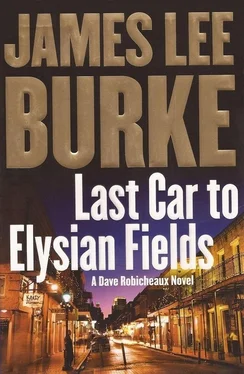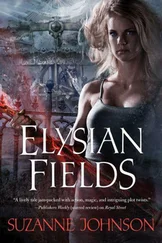His eyes left mine. Even though he was a hard-bodied man, he looked small in the bed, his spoon clutched in a childlike fashion. “I never had that big a drinking problem. It was just when I was married,” he said.
“The man who attacked you didn’t have the right to do what he did,” I said.
He frowned and ran his tongue over the swelling in his bottom lip.
“Just leave me alone,” he said.
“One day you’re going to have to do a Fifth Step on the injury you caused me and my family. My father built that house in the Depression with his own hands. My second wife was murdered in it. Her blood was in the wood,” I said.
“I’m sorry,” he said.
“Maybe you are,” I said. I put my business card on his nightstand. “I think you have a lot of information about the dealings of some bad people, Herbert. Why take their bounce?”
“I haven’t done anything wrong,” he replied.
I drummed my fingers on top of the chair where my raincoat rested and looked out the window at an oak tree whipping in the wind, its leaves shredding high in the air. Then I picked up my raincoat and left, just as the nurse entered with the letter I had typed at the nurse’s station.
“This was left for you, Mr. Vidrine,” I heard her say behind me.
I waited five minutes, then reentered Vidrine’s room. “I forgot my hat,” I said, picking it up from the chair.
The letter I had written lay unfolded on top of his bed tray. He was staring into space, his expression disjointed, like a man at a bus stop who has watched the bus’s doors close in his face and the bus drive away without him.
The letter I had typed at the nurse’s station read as follows:
Herbert,
Sorry you got your ass stomped by that queer bait we had trouble with at the cafe in Jeanerette. But if you can’t deal with a fat shit like that, I don’t need you on the job. Take this as your official notice of termination. Also be advised you are forfeiting all fees due on uncompleted work.
Will Guillot
“Something wrong?” I asked.
“Yeah, there is. You want to know about Sunbelt Construction?”
“Yeah, what’s up with these guys?”
“They got connections with gangsters in New Orleans.”
“That’s not real specific.”
“Maybe they’re selling dope. I’m not sure. But Will Guillot is going to take over the company. He’s got something on the old man.”
“Castille LeJeune?”
“Yeah, him. The war hero.”
“What does Guillot have on him?”
“I don’t know. I asked him once and all he said was, “I finally got the goods on both him and that cunt.” I asked him which cunt he meant.
He told me it wasn’t my business.”
“Ever hear the name of Junior Crudup?”
“No,” he said.
It had stopped raining outside. The sky was gray, the sun buried in a cloud like a wet flame, the hospital lawn blown with camellia petals.
“That’s all you got for me, Herbert? It’s not too much,” I said.
“I’m an electrician. People don’t confess their sins to me.”
“See you around,” I said.
“One time I told Will Fox Run was a beautiful place. He said, “Don’t let it fool you. All these places got a nigger in the woodpile.” I wasn’t sure what he meant, though.” He tilted his head inquisitively, waiting for me to speak, as if somehow we were old friends.
So Vidrine repeated a racist remark that confirms what you already knew,” Helen said in her office an hour later. “Maybe a convict was killed on the LeJeune plantation fifty years ago. Or maybe not. We didn’t find a body, bwana.”
“That’s the point,” I said. “How could Will Guillot be blackmailing Castille LeJeune about the death of Junior Crudup? Guillot has something else on him.”
“I’m glad we cleared that up. Now get out of here,” she replied.
I couldn’t blame Helen for her feelings. The real issues were the murders of the daiquiri-store operator and Fat Sammy Figorelli, and in both instances we had no viable suspects. In the meantime I had gotten myself abducted, gotten deeply involved in a murder case from a half century ago, and had helped bring Max Coll to our community.
As a member of Alcoholics Anonymous, the axiom “keep it simple” was supposed to guide my daily life.
What a joke.
But Helen herself had said the real problem lay in the fact we were dealing with Dagwood and Blondie. Amateurs hide in plain sight. They also do not feel guilty about the misdeeds they commit. They attend church, Kiwanis meetings, belong to the Better Business Bureau, support every self-righteous moral cause imaginable, and float like helium balloons right over whole armies of cops looking for miscreants in off-track betting parlors, triple-X motels, and crack houses.
The word criminal is more an emotional than legal term. Go to any U.S. post office and view the faces on the wanted posters. Like Dick Tracy caricatures, they stare out of the black-and-white photographs often taken in late-night booking rooms unshaved, pig snouted, rodent eyed, hare lipped, reassuring us that human evil is always recognizable and that consequently we will never be its victim.
But every longtime cop will tell you that the criminals who scared him most were the ones who looked and talked like the rest of us and committed deeds that no one, absolutely no one, ever wants to have knowledge of.
Five or six years ago Helen and I had to fly to Deer Lodge, Montana, and question a kid whose execution was scheduled in three days. We were not prepared for what we saw when he was brought into the interview room in a short-sleeve, orange jumpsuit and leg and waist chains. His first name was Kerry, and the softness in his name was like both his features and his North Carolinian accent. He had no cigarette odor, no tattoos, no needle tracks. His auburn hair was shampooed, clipped on the ends, and kept falling across his glasses, so that he constantly twitched his head to shake a loose strand out of his vision.
While we questioned him about a murder in Iberia Parish, his large glasses wobbled with reflected light and a strange, almost self-effacing smile never left his mouth. If he bore anger or resentment toward anyone, I could not detect it.
He had been sentenced to death for tying a rancher and his wife to chairs in their kitchen and butchering them alive. While on Death Row he helped organize a riot that resulted in the convict takeover of the entire maximum-security area. Kerry also was a chief participant in the fate of five snitches who were pulled out of protection cells, tortured, and lynched with wire loops from the second tier of a lock-down section.
He said he knew nothing of the homicide in Iberia Parish.
“Your fingerprints at the murder scene indicate otherwise. Maybe the victim had it coming. Why not get your interpretation of events on the books?” I said.
He nipped his head to clear a strand of hair from his glasses and smiled at a joke that only he seemed to understand.
We gave it up. But before we left the interview room I had to ask him another question. “What do you think lies on the other side, Kerry?” I said.
He had a slight cold and couldn’t wipe his nose because his hands were manacled at the waist, so he huffed air out of his nostrils before he answered. “You just move on to another plane of existence,” he said.
The afternoon of his injection he had to be awakened from a sound sleep. Minutes later the death warrant was read and he was videotaped by a member of the medical examiner’s office on the way to the execution chamber. He grinned at the camera and said, “Hi, Mom,” and jiggled all over with laughter.
I went to bed early that night and listened to the rain hitting the tin roof of my rented house. The fog was white in the trees, a lighted tugboat out on the Teche, its gunnels hung with rubber tires, glistening inside the rain. I slept the sleep of the dead.
Читать дальше












